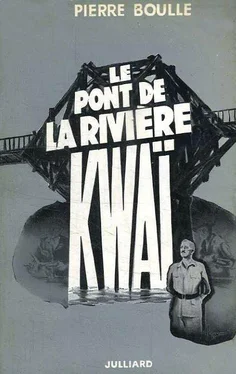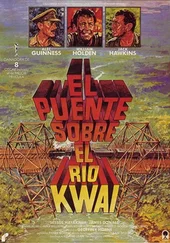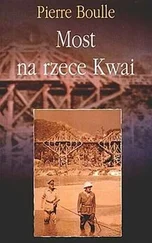“I believe you’re right, Clipton,” the Colonel solemnly replied, “and I’m afraid we’re in for a rather stormy passage.”
At one moment Clipton thought that the stormy passage Colonel Nicholson had forecast was going to be a short one and would end, almost before it had begun, in terrible tragedy. As a medical officer, he was the only officer who was not directly involved in the dispute. Already up to his eyes looking after the countless casualties due to exposure in the jungle, he was not included in the labor corps; but this only served to intensify his fear when he witnessed the first clash from the building pompously labeled “Hospital,” where he had reported for duty before dawn.
Awakened while it was still dark by the whistles and the shouts of the guards, the men had gone on parade in an ugly mood, still muddled and not yet fully recovered from the effects of the mosquitoes and the wretched quarters. The officers had fallen in where they were told. Colonel Nicholson had given them definite instructions.
“We must co-operate,” he had said, “as far as is compatible with our sense of honor. I, too, shall go on parade.”
It was understood that obedience to Saito’s orders would go no further than that.
They were kept there for some time, standing to attention in the cold and damp; then, as the sun rose, they saw Colonel Saito appear, surrounded by junior officers and walking in front of the engineer who was to direct the working parties. He seemed to be in a bad mood, but beamed as soon as he saw the British officers lined up behind their commanding officer.
A truck full of tools brought up the rear. While the engineer was supervising the issue of these, Colonel Nicholson stepped one pace forward and asked to speak to Saito. The latter’s face clouded over. He said nothing, but the Colonel pretended to regard this silence as a sign of assent and went forward to meet him.
Clipton could not follow his movements, for he had his back to him. But after a while he came into view, sideways, and the M.O. saw him wave a little book in the Jap’s face, drawing his attention to one particular paragraph—in the Manual of Military Law, no doubt. Saito was taken aback. For a moment Clipton thought that a good night’s sleep might have put him in a better frame of mind, but he soon saw what a vain hope that was. After the speech he had made the previous evening, even if he was no longer in a bad temper, the vital importance of “saving face” now dictated his conduct. He went purple with anger. He had expected to have heard the last of this business, and here was the Colonel bringing it up all over again. Such obstinacy drove him into a fit of raving hysteria. Colonel Nicholson was calmly reading, running his finger along each line, unaware of the transformation that had taken place. Clipton, who could see the change in the Jap’s expression, almost shouted out loud to warn his C.O. It was too late. With two swift strokes Saito had sent the book flying and slapped the Colonel in the face. He was now standing straight in front of him, bending forward, his eyes popping out of his head, flinging his arms about, and yelling abuse in a grotesque mixture of English and Japanese.
In spite of his surprise—for he had not expected this reaction—Colonel Nicholson kept his head. He picked up his book, which had fallen into the mud, stood up again in front of the Jap, over whom he towered head and shoulders, then calmly announced:
“In that case, Colonel Saito, since the Japanese authorities refuse to abide by the laws in force in the rest of the civilized world, we consider ourselves absolved from our duty to obey you. It only remains for me to let you know what orders I’ve given. My officers will not do manual labor.”
Having said this, he suffered, without a murmur, a second, still more savage attack. Saito, who seemed to have gone berserk, leaped at him and, standing on tiptoe, hammered away at the Colonel’s face with his fists.
The situation was beginning to get out of hand. Some of the British officers stepped out of the ranks and advanced in a threatening manner. An angry growl rose from the rest of the unit. The Japanese N.C.O.s shouted a word of command, and the soldiers cocked their rifles. Colonel Nicholson asked his officers to fall in again, and ordered his men to stay where they were. Blood was pouring from his mouth, but he still preserved his air of authority, which nothing could alter.
Saito, panting hard, stepped back and made as if to seize his revolver; then he seemed to think better of it. He stepped further back and issued an order in an ominously controlled tone of voice. The Japanese guards surrounded the prisoners and motioned them forward. They marched them off in the direction of the river, to the building yards. There were one or two protests and a slight show of resistance. A few anxious glances of inquiry were fixed on the Colonel, who made it clear he wanted them to obey the order. They eventually disappeared, and the British officers were left alone on the parade ground, facing Colonel Saito.
The Jap started talking again, in measured tones which Clipton found unnerving. His fears were not groundless. Some soldiers went off and came back with the two machine guns which were kept at the main gate of the camp. They set them up, one on either side of Saito. Clipton’s uneasiness turned to cold terror. He had a view of the whole scene through the bamboo partition of his “hospital.” Behind him, lying in heaps, were a score of wretches covered with open sores. Some had dragged themselves forward and were looking on as well. One of them gave a hoarse cry:
“Doc, they’re not going to… surely they can’t? That yellow baboon wouldn’t dare! But the old man’s sticking to his guns!”
Clipton thought it was quite likely that the yellow baboon would dare. Most of the officers standing behind the Colonel were of the same opinion. Mass executions had taken place at the fall of Singapore. Saito had obviously ordered the men off the parade ground so that there should be no tiresome witnesses. He was now speaking in English, ordering the officers to pick up the tools and report for duty.
Colonel Nicholson’s voice made itself heard again. He repeated his refusal. No one moved. Saito gave another order. Ammunition belts were slipped in and the guns were trained on the squad.
“Doc,” sobbed the soldier standing next to Clipton, “Doc, the old man won’t give in. I’m telling you, he don’t understand. We’ve got to do something.”
These words spurred Clipton into action; until then he had felt half paralyzed. It was quite clear that the “old man” did not appreciate the situation. He did not for a moment doubt that Saito would stop at nothing. Something had to be done, as the soldier said; the “old man” had to be told that he could not sacrifice the lives of twenty others out of sheer stubbornness and for the sake of his principles; that neither his honor nor personal dignity would suffer as a result of giving in to brute force, as everyone else in the other camps had done. The words were on the tip of his tongue. He rushed outside, shouting to Saito.
“Wait a moment, Colonel, wait; I’ll tell him!”
Colonel Nicholson rebuked him with a frown.
“That’ll do, Clipton. There’s nothing more to be said. I’m quite aware of what I’m doing.”
Clipton had not succeeded in getting as far as the squad. Two guards had seized him and pinned him down. But his violent outburst seemed to have made Saito think twice before taking action. Clipton yelled at him, in a rapid torrent of words, so that the other Japanese should not understand.
“I warn you, Colonel, I witnessed the whole scene; and so did the forty men in the hospital. You won’t succeed in inciting us into a general riot or a mass attempt to escape.”
Читать дальше











